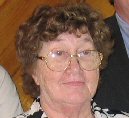







|
Marion Jeannette Beaton Grant: The First 80 Years
Part 10: Introduction to Book II, The Second 80 Years |
||
|
|
by Colin Edmund Grant
Part 1
Part 2
Part 3
Part 4
Part 5
Part 6
Part 7
Part 8
Part 9
Part 10
Epilogue
In many ways, Marion's life has been driven by exactly two things: duty and survival. It was her duty to be a good daughter, and a good big sister, and to do well at school, and to marry and have children, and more children, and MORE children, until she decided that there was NO WAY God would punish her for saying "eight is enough". It was her duty to be a loving Mom, and to do the best job she could do raising those kids, and to see to it that they were well educated not only on Monday through Friday, but at home as well, especially on Sundays. It was her duty to continue to be a mother to her children even after they reached adulthood. It was her duty to be a good wife, and to contribute to her community, and to be a good citizen.
It was never easy to do any of those things, because a lot of time had to be spent on mundane matters, such as survival. She was from a family that had little more than basic food and shelter from 1930 to 1940. She married into a family that was consistently about 20% short of the cash that would have made them comfortable for the first 30 years of her marriage. She was not going to starve to death, but she was never going to have much disposable income. And there was always going to be work to be done, washing the floors, doing the laundry, mending the clothes, ironing the shirts, cooking the meals, and starting all over again tomorrow.
To this day, although she could afford it, her life experience -- her financial conditioning, if you will; the gnawing, inescapable knowledge that one is mad to be extravagant, that the other shoe is inexorably destined to drop -- prevents her from doing such things as splurging at fancy restaurants. Her brother (and now housemate) Hugh, who had a smaller family with more upscale habits, just smiles quietly when they go out for lunch and end up at Dairy Queen. He'd prefer The Tavern on the Green, but, hey, Dairy Queen is nice, too.
From time to time, one of her kids will treat her to an elegant dinner at first rate establishment, one perhaps with a sommelier and definitely no "dollar menu". She delights in such luxuries, but seems to look over her shoulder, perhaps expecting mother Annie or some other ancestor to appear and lecture her for her indulgence. As a rule, we don't let Marion see the bill, lest she keel over. (Occasionally she'll ask for the total, and, upon seeing the damage, will giggle like a little girl who has just eaten an entire Hershey bar. It's a great thing.)
In a life that has been defined and driven largely by duty and survival, there seems to have been quite a lot of happiness in there. Everyone who knows Marion, from family to the bankers to the pharmacists to the auto mechanic to the guy (originally from Revere) who bags the groceries at Winn Dixie, remarks on how relentlessly pleasant, happy and upbeat she is. Oh, she is still capable of blowing her stack now and then (ask Hugh!), but these squalls pass quickly and are generally followed by cake.
The first 80 years, for all the duty and struggle, were also rich in smiles and laughter and delight and -- not that we Grants would ever acknowledge this -- love.
If I can, I'll report back when Ma turns 100. I bet Marion will be here (and still smiling about something), but I'm not so sure about me. I am optimistic, though, which I must have inherited from my mother.
Part 1
Part 2
Part 3
Part 4
Part 5
Part 6
Part 7
Part 8
Part 9
Part 10
|










|